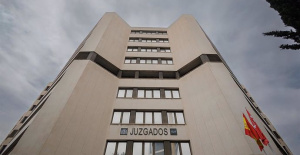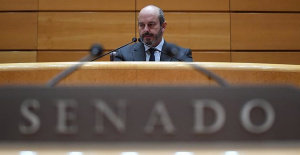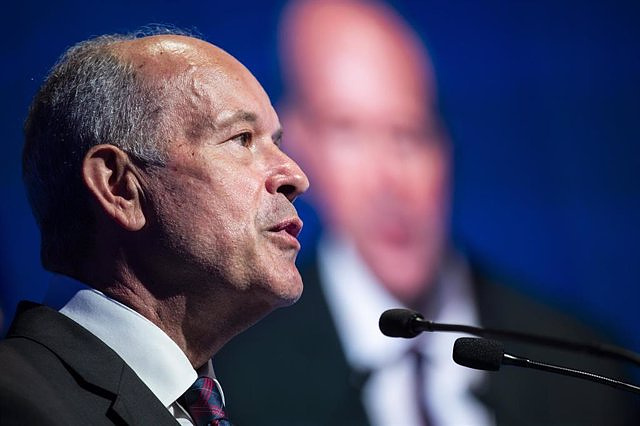They believe that their new position as magistrate of the TC is "incompatible" with finishing off their obligations in the AN
MADRID, 23 Ene. (EUROPA PRESS) -
The two members of the General Council of the Judiciary (CGPJ) who voted against allowing Juan Carlos Campo to finish the trial of the 'Defex case' in the National Court (AN), after becoming a magistrate of the Constitutional Court (TC), They have issued a dissenting vote in which they argue that they are two incompatible functions, while reproaching the former Minister of Justice for continuing in the oral hearing before receiving authorization from the CGPJ.
In their vote, to which Europa Press has had access, the members José Antonio Ballestero and Nuria Díez Abad distance themselves from the agreement reached on January 12 by the Permanent Commission of the CGPJ, with which Campo was allowed to combine his new work in the TC with that of a magistrate of the Criminal Chamber of the National Court, as requested on December 31, in order to finish the trial of the 'Defex case'.
Specifically, the Permanent Commission gave him the 'placet' to "conclude the sessions, deliberations and voting that correspond" to this trial, which this Monday has been seen for sentencing.
For this, it was based on article 256 of the Organic Law of the Judiciary (LOPJ), which establishes that "when a judge or magistrate is transferred or retired, he will deliberate, vote, write and sign the sentences, as appropriate, in lawsuits whose hearing has been attended and which have not yet been decided, unless there is a cause of incompatibility or the annulment of the hearing for another reason".
The dissenting members explain that the Permanent Commission applied said precept by analogy because, although the function of magistrate of the TC "is incompatible" with that of magistrate of the AN, since the situation in the Field "is not that of active service, but rather of special services", as it was part of the court that judges 'Defex' and the oral hearing had already begun, "this cause of incompatibility would force the annulment of the sessions already held".
On the contrary, Ballestero and Díaz Abad believe that "the adopted solution violates the statute of magistrate of the TC, as defined in article 19.1 of the Organic Law of the Constitutional Court (LOTC), according to which this position is incompatible with the exercise of any jurisdiction or activity of the judicial or fiscal career".
"It is striking that no reference to this article is made in the motivation of the adopted agreement. Nor does the applicant cite any legal precept in support of his claim," they point out.
They focus on the fact that "the situations contemplated in the aforementioned precepts --retirement or change of destination--", which would make it possible to exempt this incompatibility, "do not keep any identity of reason with those others that give rise to special services".
"They are simply incomparable, except, for example, that we imagine the Ombudsman or the State Attorney General holding a trial and passing sentence," they illustrate.
They maintain that "they are not comparable because the exercise of the position of magistrate of the Constitutional Court, due to its relevance in the institutional system, is accompanied by a strict regime of incompatibilities, which does not coincide with that of judges and magistrates."
In addition, Ballestero and Díaz Abad record that on January 11, "before obtaining the mandatory authorization," Campo "already participated in a session of the aforementioned oral trial."
On the other hand, the members Juan Manuel Fernández and Juan Martínez Moya have issued a concurring vote, to which Europa Press has also had access, because, although they agree to give Campo this small extension, they believe that "the legal basis of the agreement is incomplete."
Thus, they understand that attention should have been paid to the "notorious fact" that when the Permanent Commission gave the green light to Campo, "already being in a situation of special services", he had participated in "at least three trial sessions", those of 10 ,11 and 12 January.
In this regard, the two members emphasize that "several sessions of the plenary have been held without having waited for the decision of this constitutional body on the request made by Campo on December 31." "Also signify his willingness to conclude the oral trial," they add.
However, they warn "of the damages that would be derived for the development of the aforementioned oral trial, if the aforementioned request is not granted, causing procedural and, possibly, material damage."
Likewise, they indicate that, "according to the reiterated doctrine of the TC", article 256 of the LOPJ must be applied "in guarantee of the fundamental right to the judge predetermined by law, which concerns not only the body, but also the person or person of the judges and magistrates called to hear" the case.
"An internal government decision that could determine the change of personnel in the conformation of the Chamber, without adjusting to a clear legal criterion, would openly compromise that fundamental right," they affirm.

 Exploring Cardano: Inner Workings and Advantages of this Cryptocurrency
Exploring Cardano: Inner Workings and Advantages of this Cryptocurrency Seville.- Economy.- Innova.- STSA inaugurates its new painting and sealing hangar in San Pablo, for 18 million
Seville.- Economy.- Innova.- STSA inaugurates its new painting and sealing hangar in San Pablo, for 18 million Innova.- More than 300 volunteers join the Andalucía Compromiso Digital network in one month to facilitate access to ICT
Innova.- More than 300 volunteers join the Andalucía Compromiso Digital network in one month to facilitate access to ICT Innova.-AMP.- Ayesa acquires 51% of Sadiel, which will create new technological engineering products and expand markets
Innova.-AMP.- Ayesa acquires 51% of Sadiel, which will create new technological engineering products and expand markets The judge who admitted the complaint of Clean Hands against Begoña Gómez interrogates two media officials this Friday
The judge who admitted the complaint of Clean Hands against Begoña Gómez interrogates two media officials this Friday Thousands of people in Palma demand to defend Catalan against the "involutionary policies" of "a fanatical minority"
Thousands of people in Palma demand to defend Catalan against the "involutionary policies" of "a fanatical minority" Menotti, maestro of Argentine football since the 1978 World Cup, dies
Menotti, maestro of Argentine football since the 1978 World Cup, dies The amnesty faces its final stretch in the Senate with the question of whether it will be voted this week or after the Catalan elections.
The amnesty faces its final stretch in the Senate with the question of whether it will be voted this week or after the Catalan elections. How Blockchain in being used to shape the future
How Blockchain in being used to shape the future Not just BTC and ETH: Here Are Some More Interesting Coins Worth Focusing on
Not just BTC and ETH: Here Are Some More Interesting Coins Worth Focusing on A sensor system obtains the fingerprint of essential oils and detects if they have been adulterated
A sensor system obtains the fingerprint of essential oils and detects if they have been adulterated Faraday UPV presents the 'Origin' rocket to exceed 10 km of flight: "It is the beginning of the journey to space"
Faraday UPV presents the 'Origin' rocket to exceed 10 km of flight: "It is the beginning of the journey to space" The Generalitat calls for aid worth 4 million to promote innovation projects in municipalities
The Generalitat calls for aid worth 4 million to promote innovation projects in municipalities UPV students design an app that helps improve the ventilation of homes in the face of high temperatures
UPV students design an app that helps improve the ventilation of homes in the face of high temperatures A million people demonstrate in France against Macron's pension reform
A million people demonstrate in France against Macron's pension reform Russia launches several missiles against "critical infrastructure" in the city of Zaporizhia
Russia launches several missiles against "critical infrastructure" in the city of Zaporizhia A "procession" remembers the dead of the Calabria shipwreck as bodies continue to wash up on the shore
A "procession" remembers the dead of the Calabria shipwreck as bodies continue to wash up on the shore Prison sentences handed down for three prominent Hong Kong pro-democracy activists
Prison sentences handed down for three prominent Hong Kong pro-democracy activists ETH continues to leave trading platforms, Ethereum balance on exchanges lowest in 3 years
ETH continues to leave trading platforms, Ethereum balance on exchanges lowest in 3 years Investors invest $450 million in Consensys, Ethereum incubator now valued at $7 billion
Investors invest $450 million in Consensys, Ethereum incubator now valued at $7 billion Alchemy Integrates Ethereum L2 Product Starknet to Enhance Web3 Scalability at a Price 100x Lower Than L1 Fees
Alchemy Integrates Ethereum L2 Product Starknet to Enhance Web3 Scalability at a Price 100x Lower Than L1 Fees Mining Report: Bitcoin's Electricity Consumption Declines by 25% in Q1 2022
Mining Report: Bitcoin's Electricity Consumption Declines by 25% in Q1 2022 Oil-to-Bitcoin Mining Firm Crusoe Energy Systems Raised $505 Million
Oil-to-Bitcoin Mining Firm Crusoe Energy Systems Raised $505 Million Microbt reveals the latest Bitcoin mining rigs -- Machines produce up to 126 TH/s with custom 5nm chip design
Microbt reveals the latest Bitcoin mining rigs -- Machines produce up to 126 TH/s with custom 5nm chip design Bitcoin's Mining Difficulty Hits a Lifetime High, With More Than 90% of BTC Supply Issued
Bitcoin's Mining Difficulty Hits a Lifetime High, With More Than 90% of BTC Supply Issued The Biggest Movers are Near, EOS, and RUNE during Friday's Selloff
The Biggest Movers are Near, EOS, and RUNE during Friday's Selloff Global Markets Spooked by a Hawkish Fed and Covid, Stocks and Crypto Gain After Musk Buys Twitter
Global Markets Spooked by a Hawkish Fed and Covid, Stocks and Crypto Gain After Musk Buys Twitter Bitso to offset carbon emissions from the Trading Platform's ERC20, ETH, and BTC Transactions
Bitso to offset carbon emissions from the Trading Platform's ERC20, ETH, and BTC Transactions Draftkings Announces 2022 College Hoops NFT Selection for March Madness
Draftkings Announces 2022 College Hoops NFT Selection for March Madness




























